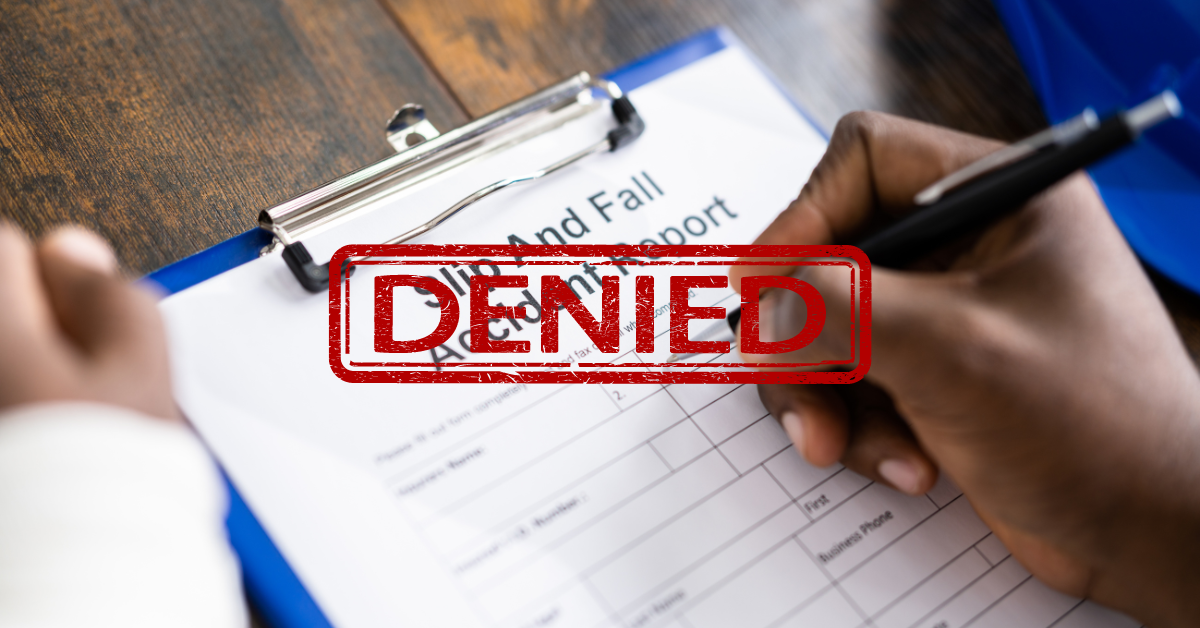Slip and Fall Claim Denied: What Should I Do?
A slip and fall could cause serious bodily harm, resulting in expensive medical bills and lost wages from the inability to work. They also hinder victims from going about their daily lives due to the injuries sustained. While they are sometimes unpredictable, there are other cases in which another party is liable for the slip and fall. In either case, you should contact a slip and fall attorney as soon as possible to discuss your case and see if you are eligible for compensation.
But, filing a slip and fall lawsuit does not always lead to compensation. Sometimes Massachusetts courts will deny claims. When claims are denied, you still have the opportunity to appeal the decision with the Massachusetts Appeals Court.

Why Was My Slip and Fall Claim Denied?
Slip and fall claims can be denied for a multitude of reasons. Not every case is denied for the same reasons, so it is best to consult with your personal injury attorney after a slip and fall claim is denied. Some of the reasons for a slip and fall claim to get denied are below.
Determining Who Is At Fault
To file a personal injury lawsuit for a slip and fall, you will need to determine who is at fault for the accident. If you are unable to prove that a party is at fault, your claim can be denied. A personal injury attorney can help you determine who is at fault for an incident so that your claim is properly filed. In some cases, a third party that was originally looked over may be at fault. When appealing the decision with the Massachusetts Appeals Court, it is important to provide sufficient evidence that a third party is at fault.
Pre-Existing Conditions
Victims of a slip and fall who have a pre-existing condition may have trouble getting their claim approved. If someone with a pre-existing condition that impacts their back slips and falls and hurts their back, there is a chance that their claim could be denied if there is not enough evidence to prove that the back injury was sustained due to another cause. This is why providing sufficient evidence to support your claim is crucial to success in your case. Ensuring that you file with a thorough claim avoids the risk of having a claim denied, which means you would have to file an appeal, making the whole legal process longer.
Failing to File within the Statute of Limitations
If you suffer from a slip and fall, you have to file a personal injury claim before the deadline. Massachusetts has a two year statute of limitations for personal injury claims, including slip and fall cases. This means that a person cannot file a claim more than two years after the accident occurred. That can lead to an immediate denial from the Massachusetts Court.
How to Appeal a Denied Slip and Fall Claim
Was your slip and fall claim denied? There is still an opportunity to appeal the decision through the Massachusetts Appeals Court. Appealing a decision from the Massachusetts Appeals Court should be done with the help of your slip and fall attorney. They will ensure that you are providing the most sufficient information when appealing the decision. However, the appeals process is a complicated process that can make waiting for compensation take much longer. For this reason, it’s best to contact an attorney as soon as possible following a slip and fall, so they can help you file the initial claim.
Do I Need a Slip and Fall Lawyer?
As soon as possible after suffering from a slip and fall, you should contact a personal injury attorney to discuss your case. They can help you every step of the way to navigate legal proceedings and file a claim. In the event that your claim is denied, they can also help you file an appeal.
Slip and fall lawyers give you the best chance at getting a claim approved. It’s easy to miss crucial evidence in legal proceedings that help support your case. Navigating legal proceedings on your own can get challenging and confusing to someone who is not versed in legal jargon with the experience to win a successful case. They will make the whole process easier on you, so you can focus on recovering from your injuries.
Disclaimer
The information contained in this blog is for general information purposes only. Bonville & Howard assumes no responsibility for errors or omissions in the contents of the blog.
In no event shall Bonville & Howard be liable for any special, direct, indirect, consequential, or incidental damages or any damages whatsoever, whether in an action of contract, negligence, or other tort, arising out of or in connection with the use of this blog or the contents of this blog. Bonville & Howard reserves the right to make additions, deletions, or modifications to the contents of this blog at any time without prior notice.
